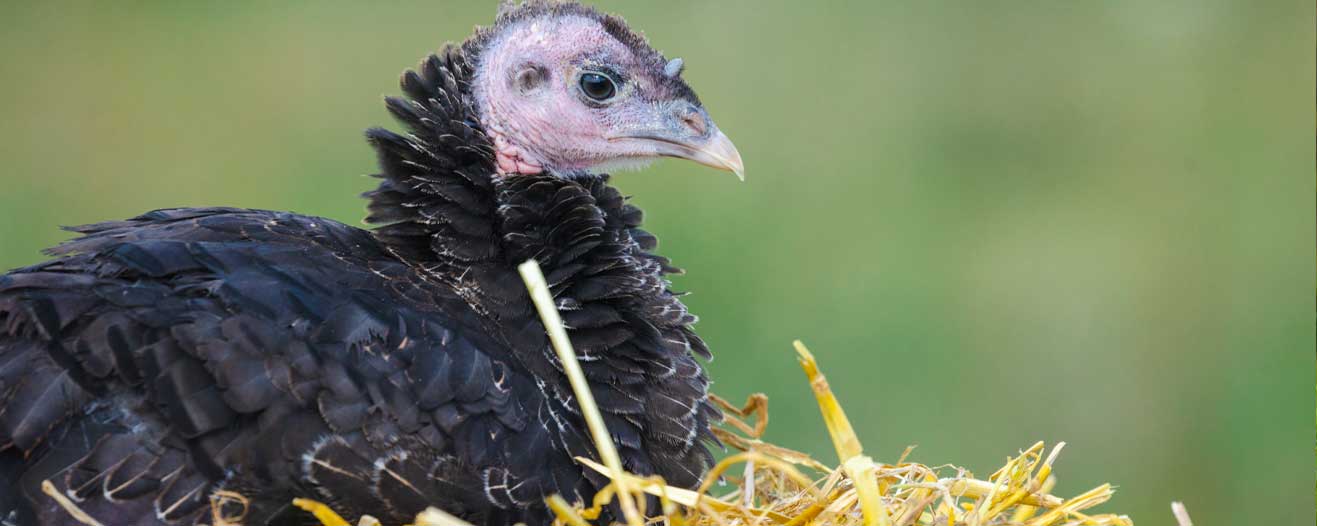How turkeys behave
To understand how to best provide for their welfare needs, it helps to have an idea of how turkeys' natural behaviours. Commercial breeds of turkey have many of the same natural instincts as their wild relatives, which include the following.
- Comfort and grooming activities, such as preening, ruffling feathers, stretching wings and dustbathing.
- Roosting on raised perches at night for comfort and to feel safe from predators.
- Running and exercising.
-
Exploring their environment.
Farming turkeys
There are three main commercial farming systems for rearing turkeys in the UK: indoor, pole-barn and free-range (including organic). In 2022, around 10 million turkeys were slaughtered in the UK for meat.
Indoor
Most turkeys in the UK are reared in standard indoor production systems. This is where they live on the floor of large, purpose-built sheds or converted farm buildings.
Indoor turkeys may be kept at high 'stocking densities', meaning lots of turkeys are kept in a relatively small amount of space. In these conditions, the turkeys are often unable to carry out their normal behaviours, such as perching and foraging. However, some indoor systems give turkeys more space, as well as natural daylight through windows and some environmental enrichment.
Pole-barn
In 'pole-barns' the upper part of the house walls are open, letting in natural light and air. However, the birds may still have limited space or not enough enrichment provided to enable them to express their natural behaviours.
Free-range and organic turkeys
In these systems, the housing may be similar to indoor or pole-barn systems, but the turkeys also have access to an outdoor area.
Farm turkey lifespans
The average live weight of turkeys at slaughter varies. Larger birds tend to be grown year-round for portioned or processed products. Birds sold whole – usually for Christmas – tend to be smaller.
Selective breeding
Selective breeding to produce larger birds with more breast meat has meant that today's breeds of turkey are now very heavy and have much more developed breast muscles.
Because of the size of typical commercial male turkeys, natural mating with the female rarely takes place as it's difficult for the male to get close enough without injuring her because she's much smaller and lighter. As a result, most breeding is carried out using artificial insemination.
Turkey welfare concerns
Here's more on the key issues surrounding the welfare of turkeys reared for meat in the UK. Careful management and providing turkeys with all the things they need to carry out their natural behaviours can help to avoid many welfare problems.
Space and enrichment
Turkeys reared in standard systems often aren't given enough space or facilities to carry out all their natural behaviours properly, such as foraging or perching, or moving around freely. Not having enough space can cause problems such as heat stress and foot pad lesions due to the birds standing or sitting on litter that may have high ammonia levels from a build-up of faeces.
Farmers can help avoid these problems by giving the turkeys more space per bird and providing environmental enrichment to allow them to move around, exercise and perform their normal behaviours.
Beak trimming and lighting
Turkeys may have their beaks trimmed if there's a risk of feather pecking, as this behaviour can cause injuries and sometimes lead to cannibalism. This procedure reduces the risk of turkeys harming each other. In the UK beak trimming may only be carried out using infra-red technology, except under specific circumstances.
Lighting may be kept at low levels to further reduce the risk of feather pecking. However, this can prevent the birds from performing many of their natural behaviours and reduce bird activity.
Handling and transport
Turkeys can experience considerable suffering if they're not handled carefully. When they're caught at the end of rearing, put into transport crates, and then transported, there's a risk of bone fractures and breaks, dislocated hips and bruising.
Improving turkey welfare
We're working to raise welfare standards for turkeys in the UK and beyond. Here's more on what we're doing.
Developing higher welfare standards for turkeys
We encourage as many turkey producers as possible to adopt the RSPCA welfare standards for turkeys, which have been developed to ensure higher standards of welfare are met from hatching to slaughter/killing. The standards cover all the key areas affecting turkey welfare, for example ensuring there's enough space and environmental enrichment for turkeys to move around, exercise and perform natural behaviours.
Campaigning work
In previous years, we've campaigned at Christmas time to encourage everyone to choose turkeys reared under higher welfare conditions, such as those labelled RSPCA Assured, free-range or organic.




